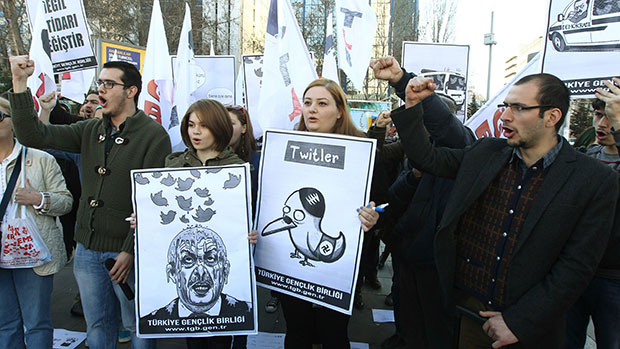US condemns Turkey Twitter ban as ‘21st-century book burning’
Turkish government stands by ban, saying ‘no global company is above the law’

A free daily email with the biggest news stories of the day – and the best features from TheWeek.com
You are now subscribed
Your newsletter sign-up was successful
TURKEY’S attempt to ban Twitter has been condemned by the United States as the modern equivalent of burning books. However, the government in Ankara has defended the policy, saying no global company is “above the law”.
Prime Minister Tayyip Erdogan imposed the ban two days ago after Twitter was used to post links to recordings that appear to incriminate him and colleagues in corruption. In one audio clip, a man thought to be Erdogan allegedly tells his son to hide cash from police investigators.
Turkey is holding municipal elections on 30 March.
The Week
Escape your echo chamber. Get the facts behind the news, plus analysis from multiple perspectives.

Sign up for The Week's Free Newsletters
From our morning news briefing to a weekly Good News Newsletter, get the best of The Week delivered directly to your inbox.
From our morning news briefing to a weekly Good News Newsletter, get the best of The Week delivered directly to your inbox.
The Turkish Twitter ban has been ridiculed at home and abroad as being both heavy-handed and ineffectual. Usage of the website has soared since the ban was imposed as Turks have found ways around it; even the president, Abdullah Gul, managed to circumvent the blockage to tweet his disapproval.
US Secretary of State Hillary Clinton tweeted yesterday: “The freedom to speak out and to connect is a fundamental right. The people of Turkey deserve that right restored.”
That followed the publication of a blog post by the State Department which described internet censorship as “21st-century book burning”, adding: “A friend like Turkey has nothing to fear in the free-flow of ideas and even criticism represented by Twitter. Its attempt to block its citizens’ access to social media tools should be reversed.”
But the Turkish government has stood by its ban. Finance minister Mehmet Simsek admitted to the BBC that the decision did not “reflect well” on his government, but said Twitter had refused to comply with court orders to remove content.
A free daily email with the biggest news stories of the day – and the best features from TheWeek.com
"I don't think any global company, whether it's a media company, whether it's an industrial company, it shouldn't see itself [as being] above the law," he said.
-
 The Olympic timekeepers keeping the Games on track
The Olympic timekeepers keeping the Games on trackUnder the Radar Swiss watchmaking giant Omega has been at the finish line of every Olympic Games for nearly 100 years
-
 Will increasing tensions with Iran boil over into war?
Will increasing tensions with Iran boil over into war?Today’s Big Question President Donald Trump has recently been threatening the country
-
 Corruption: The spy sheikh and the president
Corruption: The spy sheikh and the presidentFeature Trump is at the center of another scandal
-
 Epstein files topple law CEO, roil UK government
Epstein files topple law CEO, roil UK governmentSpeed Read Peter Mandelson, Britain’s former ambassador to the US, is caught up in the scandal
-
 Iran and US prepare to meet after skirmishes
Iran and US prepare to meet after skirmishesSpeed Read The incident comes amid heightened tensions in the Middle East
-
 Grok in the crosshairs as EU launches deepfake porn probe
Grok in the crosshairs as EU launches deepfake porn probeIN THE SPOTLIGHT The European Union has officially begun investigating Elon Musk’s proprietary AI, as regulators zero in on Grok’s porn problem and its impact continent-wide
-
 Israel retrieves final hostage’s body from Gaza
Israel retrieves final hostage’s body from GazaSpeed Read The 24-year-old police officer was killed during the initial Hamas attack
-
 China’s Xi targets top general in growing purge
China’s Xi targets top general in growing purgeSpeed Read Zhang Youxia is being investigated over ‘grave violations’ of the law
-
 Panama and Canada are negotiating over a crucial copper mine
Panama and Canada are negotiating over a crucial copper mineIn the Spotlight Panama is set to make a final decision on the mine this summer
-
 Why Greenland’s natural resources are nearly impossible to mine
Why Greenland’s natural resources are nearly impossible to mineThe Explainer The country’s natural landscape makes the task extremely difficult
-
 Iran cuts internet as protests escalate
Iran cuts internet as protests escalateSpeed Reada Government buildings across the country have been set on fire